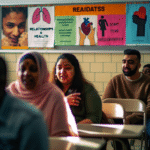This article explores the essential aspects of sexual health education, respectful relationships, and informed decision-making. By providing insights into various educational tools and resources, we aim to empower individuals to make thoughtful, informed choices about their relationships and personal well-being.
The Foundations of Sexual Health Education
Comprehensive sexual health education serves as a cornerstone for informed decision-making, equipping individuals with essential knowledge about safe sex practices, contraceptive options, and body awareness. By cultivating an understanding of personal health care, this education empowers individuals to engage in health-conscious intimacy. Increased awareness translates into safer choices, reducing risks and promoting emotional wellness. Education fosters communication and trust, encouraging individuals to establish boundaries and prioritize personal safety, ultimately leading to healthier relationships and enhanced wellbeing.
Promoting Respectful Relationships
Respectful relationships are rooted in mutual understanding, trust, and open communication, allowing individuals to set and respect boundaries. Educational initiatives like Our Watch’s Respectful Relationships program focus on fostering these dynamics by teaching essential skills that empower individuals. By promoting *informed decision-making* and *emotional care resources*, the program reduces the prevalence of violence and improves interpersonal interactions. Through fostering awareness about *trust*, *safe touch*, and *health-conscious intimacy*, such initiatives create a supportive environment where individuals can thrive emotionally and physically, laying the foundation for enduring, respectful connections.
Tools for Healthy Relationship Building
Healthy relationship building necessitates the integration of various resources that emphasize education on boundaries, trust, and communication. Programs that focus on **emotional wellness** and **relationship awareness** train individuals to recognize and respect personal limits while fostering a culture of open dialogue. Workshops and curricula on **safe touch awareness** and **health-based intimacy** empower individuals by providing knowledge about **personal health care** and **contraceptive options**. Utilizing tools such as role-playing scenarios and discussions about **supportive health knowledge** can enhance understanding of healthy connection dynamics, ultimately leading to safer emotional interactions.
Empowering Informed Decision-Making
Informed decision-making serves as a cornerstone for navigating healthy relationships, emphasizing the importance of clarity and openness. By equipping individuals with comprehensive sexual health education, respectful relationship dynamics, and knowledge about safe touch, personal health safety can be prioritized.
This encompasses understanding body awareness, contraceptive options, and emotional wellness resources. Trust and communication are bolstered by transparent discussions around boundaries and intimacy, ultimately fostering thoughtful connections. Elevated awareness leads to empowered individuals who can engage in health-conscious intimacy, establishing a cycle of informed choices and supportive relationship practices.
Supportive Health and Emotional Wellness
Supportive health and emotional wellness are essential when fostering relational skills grounded in mutual respect. By prioritizing personal health safety and safe touch awareness, individuals can cultivate environments that promote emotional care. Integrating wellness lifestyle support encourages open dialogue regarding boundaries, enhancing trust and communication. Resources such as workshops, counseling, and educational materials provide critical guidance, empowering individuals to navigate intimacy thoughtfully. Understanding one’s own body and emotional needs fosters caring relationships, thereby enriching connections and promoting relational wellness.
Summary of Key Points
A holistic approach to relationship education fosters safer and more respectful interactions. By integrating comprehensive knowledge, trust, openness, and informed decision-making, individuals can build healthier relationships rooted in mutual understanding and care.






Leave a Reply